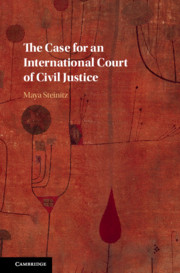Book contents
- The Case for an International Court of Civil Justice
- The Case for an International Court of Civil Justice
- Copyright page
- Dedication
- Contents
- Acknowledgments
- Abbreviations
- Introduction
- 1 How New International Courts Come into Being
- 2 The Human Toll
- 3 The Problem of the Missing Forum
- 4 The Business Case for the ICCJ
- 5 Institutional and Procedural Features of an ICCJ
- Conclusion
- Notes
- Index
3 - The Problem of the Missing Forum
Published online by Cambridge University Press: 07 November 2018
- The Case for an International Court of Civil Justice
- The Case for an International Court of Civil Justice
- Copyright page
- Dedication
- Contents
- Acknowledgments
- Abbreviations
- Introduction
- 1 How New International Courts Come into Being
- 2 The Human Toll
- 3 The Problem of the Missing Forum
- 4 The Business Case for the ICCJ
- 5 Institutional and Procedural Features of an ICCJ
- Conclusion
- Notes
- Index
Summary
- Type
- Chapter
- Information
- The Case for an International Court of Civil Justice , pp. 83 - 107Publisher: Cambridge University PressPrint publication year: 2018



